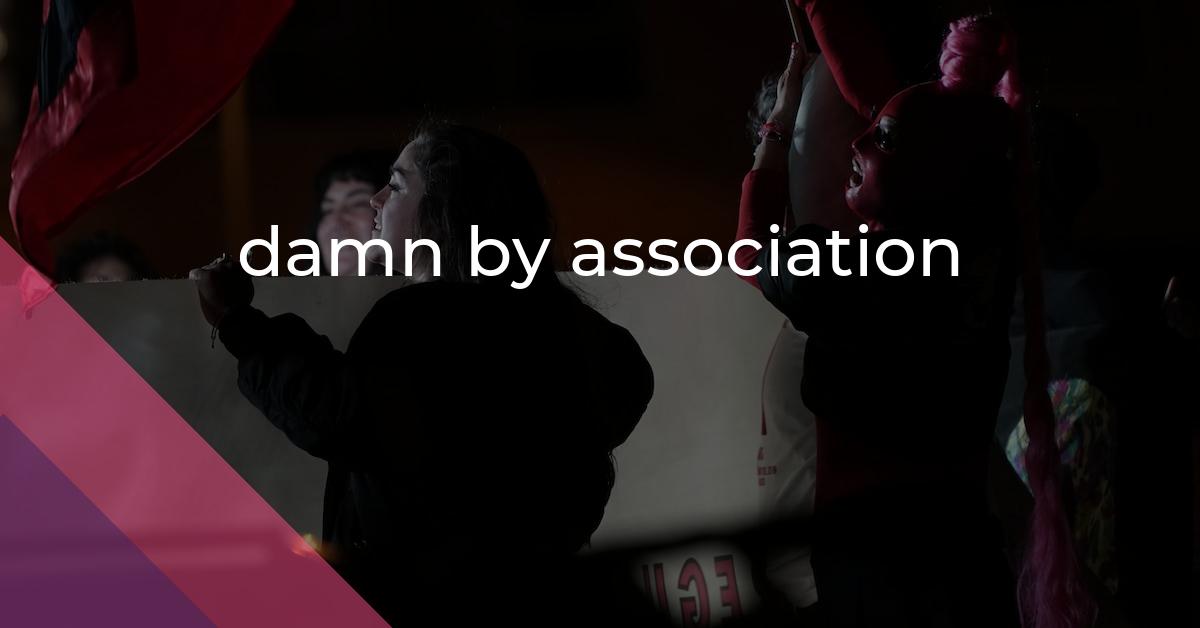damn by association: Idiom Meaning and Origin
What does ‘damn by association’ mean?
"Damn by association" means to be blamed or held responsible for something bad or negative that someone else did, simply because you are connected or associated with that person.

Idiom Explorer
An idiom meaning being in the company of people who have negative or harmful influence.
The idiom "I'll be damned" is used to express shock, disbelief or surprise when something unexpected or unbelievable happens.
The idiom "hell to pay" means to face severe consequences or trouble for one's actions or decisions.
The idiom "hell mend someone" means that someone will have to suffer the consequences or outcomes of their actions, usually in a negative way.
The idiom "have someone's blood on one's head" means to be responsible or guilty for causing harm or death to someone.
The idiom "have it coming" means to deserve or expect something, usually negative, as a consequence of one's actions or behavior.
The idiom "get what's coming to one" means to receive the punishment or consequences that one deserves for their actions or behavior.
The idiom "fucked over" is a vulgar way to describe someone being deceived, betrayed, or treated unfairly by others, usually resulting in negative consequences or harm. It implies a sense of being taken advantage of and often carries strong emotions of anger, frustration, or disappointment.
The Unfortunate Connections
The idiom "damn by association" implies guilt or condemnation through association or affiliation with a person or group. One can be held accountable for the actions or beliefs of others simply by being connected to them in some way. This concept, often referred to as guilt by association, highlights the negative consequences that can arise from being affiliated with someone or something that is deemed disreputable or morally objectionable.
While the specific origin of "damn by association" may not be known, it has become a common expression in the English language. Its meaning has been established and spread over time through usage and context.
Like many idioms, the exact origins of "damn by association" are not well-documented. It likely emerged from the broader concept of guilt by association, which has been understood throughout history. Individuals have often been judged or condemned based on their associations, real or perceived. This historical context may have contributed to the acceptance and use of this idiom.
The idiom "damn by association" can be found in various contexts, including politics, personal relationships, and popular culture. It underscores the potential negative consequences of aligning oneself with individuals, groups, or ideas that are considered unfavorable or morally objectionable by society.
Furthermore, this idiom reflects a cultural and moral framework that emphasizes individual responsibility and agency. It suggests that individuals should be mindful of the company they keep and the potential implications it may have on their reputation or character.
While the idiom "damn by association" is simple and clear in conveying its meaning, it also invites interpretation and exploration. It prompts us to question the extent to which individuals should be held accountable for the actions or beliefs of those with whom they are associated, as well as the ethical implications of such judgments.
The idiom "damn by association" reminds us of the potential consequences of aligning ourselves with individuals, groups, or ideas that are deemed disreputable or morally objectionable. Its usage and impact have been shaped by its association with the broader concept of guilt by association, which has a historical and cultural grounding. The significance of this idiom lies not only in its literal interpretation but also in the underlying questions it raises about individual responsibility and the complexities of moral judgment.
The idiom "damn by association" is closely related to the idiom "bad company." Both idioms emphasize the negative consequences that can arise from associating with disreputable individuals or groups. In both cases, there is an understanding that one's reputation or character may be negatively impacted by the company they keep.
In a similar vein, the idiom "damn by association" is also related to the idiom "damned if one does and damned if one doesn't." Both idioms convey the idea that a person may face negative consequences regardless of the choices they make. Whether they choose to associate with a disreputable individual or not, they may still be judged or condemned. This highlights the challenging nature of navigating social and moral judgment.
Finally, the idiom "damn by association" is connected to the idiom "wrong crowd." Both idioms emphasize the notion that associating with a particular group of people can lead to negative outcomes. The idiom "wrong crowd" suggests that being in the company of individuals with a negative influence can result in undesirable consequences. In a similar sense, "damn by association" warns of the potential guilt or condemnation one may face by being associated with disreputable individuals or groups.
Example usage
Examples of how the idiom "damn by association" can be used in a sentence:
- He was considered guilty by damnation of association, simply because he was friends with a known criminal.
- The politician's reputation was tarnished by damnation of association when he was seen attending a controversial event.
- The company faced financial troubles by damnation of association with its corrupt competitors.
The idiom "damn by association" refers to the situation where someone's reputation or image is negatively influenced or criticized due to their connection or proximity to someone or something undesirable or disreputable.
More "Coinedonyms" idioms
We missed the mark - nothing found.



